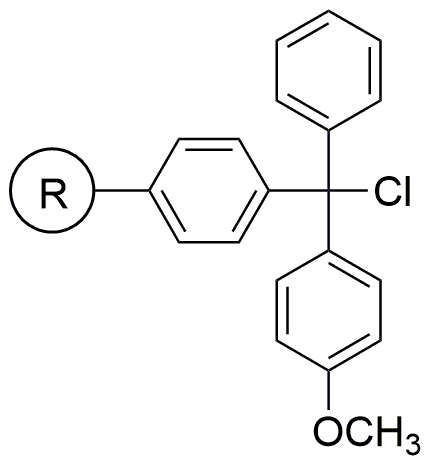4-Methoxytrityl chloride resin is widely utilized in research focused on:
- Nucleic Acid Synthesis: This resin is essential in the solid-phase synthesis of oligonucleotides, allowing for efficient attachment of nucleobases and facilitating the production of DNA and RNA sequences.
- Peptide Synthesis: It serves as a protective group in peptide synthesis, helping to prevent undesired reactions during the coupling process, thus enhancing yield and purity.
- Drug Development: In pharmaceutical research, it aids in the synthesis of complex molecules, contributing to the development of new drugs by providing a reliable platform for building chemical structures.
- Bioconjugation: The resin is used for attaching biomolecules to surfaces or other molecules, which is crucial in creating targeted drug delivery systems and diagnostic tools.
- Material Science: It finds application in the development of polymeric materials, where its unique properties can be exploited to create specialized coatings or composites with enhanced performance.
General Information
Properties
Safety and Regulations
Applications
4-Methoxytrityl chloride resin is widely utilized in research focused on:
- Nucleic Acid Synthesis: This resin is essential in the solid-phase synthesis of oligonucleotides, allowing for efficient attachment of nucleobases and facilitating the production of DNA and RNA sequences.
- Peptide Synthesis: It serves as a protective group in peptide synthesis, helping to prevent undesired reactions during the coupling process, thus enhancing yield and purity.
- Drug Development: In pharmaceutical research, it aids in the synthesis of complex molecules, contributing to the development of new drugs by providing a reliable platform for building chemical structures.
- Bioconjugation: The resin is used for attaching biomolecules to surfaces or other molecules, which is crucial in creating targeted drug delivery systems and diagnostic tools.
- Material Science: It finds application in the development of polymeric materials, where its unique properties can be exploited to create specialized coatings or composites with enhanced performance.
Documents
Safety Data Sheets (SDS)
The SDS provides comprehensive safety information on handling, storage, and disposal of the product.
Product Specification (PS)
The PS provides a comprehensive breakdown of the product’s properties, including chemical composition, physical state, purity, and storage requirements. It also details acceptable quality ranges and the product's intended applications.
Certificates of Analysis (COA)
Search for Certificates of Analysis (COA) by entering the products Lot Number. Lot and Batch Numbers can be found on a product’s label following the words ‘Lot’ or ‘Batch’.
Numéro de catalogue
Numéro de lot/série
Certificates Of Origin (COO)
This COO confirms the country where the product was manufactured, and also details the materials and components used in it and whether it is derived from natural, synthetic, or other specific sources. This certificate may be required for customs, trade, and regulatory compliance.
Numéro de catalogue
Numéro de lot/série
Safety Data Sheets (SDS)
The SDS provides comprehensive safety information on handling, storage, and disposal of the product.
DownloadProduct Specification (PS)
The PS provides a comprehensive breakdown of the product’s properties, including chemical composition, physical state, purity, and storage requirements. It also details acceptable quality ranges and the product's intended applications.
DownloadCertificates of Analysis (COA)
Search for Certificates of Analysis (COA) by entering the products Lot Number. Lot and Batch Numbers can be found on a product’s label following the words ‘Lot’ or ‘Batch’.
Numéro de catalogue
Numéro de lot/série
Certificates Of Origin (COO)
This COO confirms the country where the product was manufactured, and also details the materials and components used in it and whether it is derived from natural, synthetic, or other specific sources. This certificate may be required for customs, trade, and regulatory compliance.


